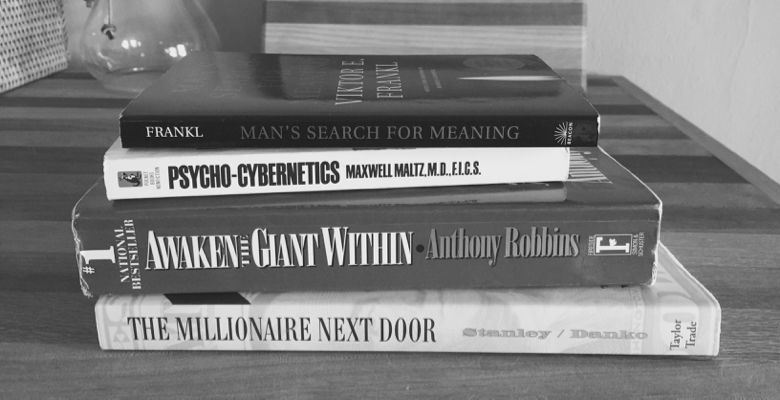Books That Changed My Life, Part I

In 2010, I started reading personal development nonfiction, and it transformed every part of my life.
I was in a tough position at the time (trying to finish a Master’s degree in trumpet performance with a severe lip injury, a truckload of self-doubt, and nearly $50,000 in student loan debt). Since I had a lot of time on my hands from being unable to play the trumpet, I started to read.
Applying principles from these books has changed my thought patterns, my behavior, and my life. Nothing’s been the same for me since.
Here are four books that I can’t imagine life without (with four more coming in my next post).
Psycho-Cybernetics
A human being always acts and feels and performs in accordance with what he imagines to be true about himself and his environment — Maxwell Maltz
Written in 1960 by Maxwell Maltz, a plastic surgeon perplexed by the fact that some of his patients felt no better about their physical appearance after cosmetic surgery, Psycho-Cybernetics is a great introduction to the world of personal development.
Psycho-Cybernetics puts you, the reader, firmly in the driver’s seat. The title sounds a little gimmicky today, but the content is timeless.
What I learned: Our self-image determines our thoughts, feelings and actions (and over time, we can drastically change our self-image). We are not “just the way we are.”
Awaken the Giant Within
How am I going to live the next ten years of my life? How am I going to live today in order to create the tomorrow I'm committed to? What am I going to stand for from now on? — Tony Robbins
Awaken the Giant Within is a sprawling, 500-page manifesto. Covering every area of life, it’s inspirational, interactive, and wide-ranging. It forced me to take notes on my own life and examine the results.
- What are my core beliefs about myself and the world, and which of these beliefs are serving me?
- What words make up my vocabulary?
- What behavior patterns do I engage in regularly without thought?
- How do I carry my physical body when I’m happy? Feeling down?
- What meaning do I assign to victories? To defeats?
It’s got flaws, to be sure (the chapter on Neuro-Linguistic Programming, for instance, hasn’t stood the test of time), and I’ve found it helpful to focus on the parts that interest me instead of reading every word.
I bought my copy used on Amazon, and it’s the best $3.82 I’ve ever spent. I’d estimate I’ve gotten 1000x the value of the purchase price from this book.
What I learned: We are in control of how we feel (our state). We can identify and replace self-limiting beliefs. Disempowering language really does disempower us. Motion creates emotion. It’s our decisions that affect our lives more than anything else. Progress = happiness.
The Millionaire Next Door
Most people have it all wrong about wealth in America. Wealth is not the same as income. If you make a good income each year and spend it all, you are not getting wealthier. You are just living high. Wealth is what you accumulate, not what you spend. — Thomas Stanley and William Danko
I read The Millionaire Next Door shortly after my dad sat me down and said “Son, you’ll be out of school in six months. You need to figure out what your monthly loan payments will be.” I’ve still got my notes from that conversation with the total: $546.55. If I hadn’t come across The Millionaire Next Door, I would still be paying them.
What I learned: Financial wealth isn’t about income, it’s about net worth. If you make a lot of money, spend aggressively, and accumulate debt, you’re going to have less freedom than someone who makes modest money, saves aggressively and avoids debt. Not to mention money doesn’t buy happiness, and all that. Along with Dave Ramsey’s Financial Peace University classes, this book helped Sarah and me go from massive debt to solid financial ground.
Man’s Search for Meaning
Everything can be taken from a man but one thing: the last of the human freedoms — to choose one’s attitude in any given set of circumstances, to choose one’s own way. — Viktor Frankl
You think you have it bad?
Viktor Frankl was an Austrian psychiatrist who survived three years in Nazi concentration camps, and Man’s Search for Meaning outlines his approach to finding meaning in any situation, even an abjectly horrible one.
The value of this book is twofold:
First, Frankl was an anomaly: a brilliant, methodical thinker and a first-hand witness to one of the darkest events of the 20th century. He had the opportunity to personally test his own theories about the nature of extreme suffering. I can’t say that of many authors.
Second, the book provides a smack on the side of the head with the perspective stick. Even if you only read the book for its story, Man’s Search for Meaning immediately puts your own first-world problems in sharp perspective.
What I learned: We can find meaning in any situation, and our ability to do so plays a major role in our quality of life. Even in the most wretched situations, we can choose to suffer with dignity.
And on that cheerful note, let’s wrap things up. But before we do, let me make a brief request: if one of these books intrigued you, take immediate action. Order it, borrow it from the library, get the audio book — get your hands on it somehow. If you’re feeling motivated, don’t let the feeling pass! Take action, or make peace with not taking action.
I’ll have four more great books for you on Friday!